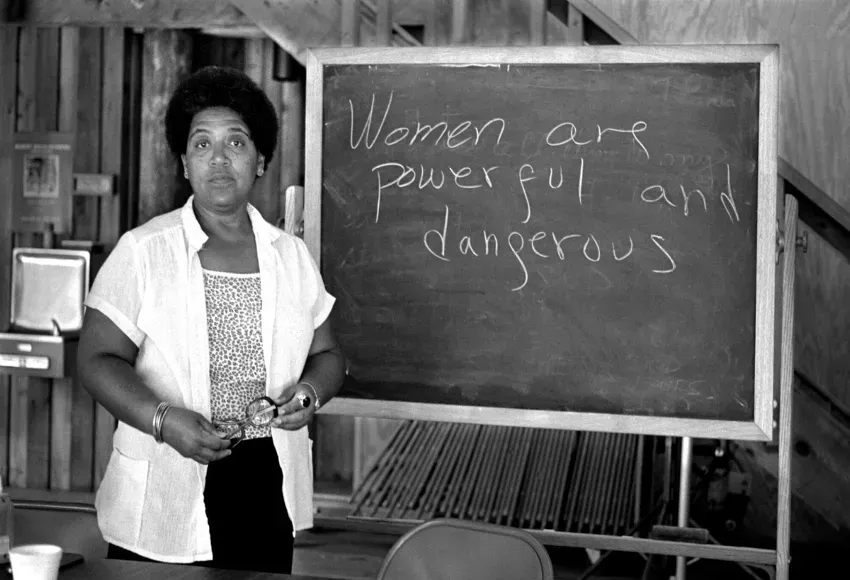Audre Lorde described herself as "black, lesbian, mother, warrior, poet"–a combination that encompasses multiple oppressions. She said: "I am defined as other in every group I'm part of."
Lorde's otherness gave her powerful insights into oppression that enflamed her poetry and made her famous for unblinking honesty. She was a "womanist"–a hardcore feminist–whose voice continues to be an aggressive advocate for social justice. Some of her work is difficult to read, even today when we've become more aware and less accepting of the micro- and macro- aggressions that permeate our everyday life.
In "Who Said It Was Simple," Lorde focuses on a casual incident at a woman's march that exposes the irony of women who accept "the slighter pleasures" of privilege without realizing that they are both the enslavers and the enslaved. The "I" of the poem (called the "persona" since we can't assume that the poet is always the subject) describes the "tree of anger" that grows from incidents like this–one of myriad roots feeding the heavy, complex branches of injustice.
In "Power," Lorde opens with a brutal idea that the reader needs to pause and consider before going on: the difference between poetry (killing yourself) versus rhetoric (killing your children). As difficult as this poem is to read and think about–a string of cruel incidents that white people perpetrate against innocent black people–the culminating idea is even more difficult to process: the way rage can turns the tables and make the oppressed into the oppressor. But the poet has to tell the truth, even if it kills her, because to avoid the truth will perpetuate the lies that are killing our children. Ultimately Lorde is affirming the claim that Poetry (because it's true) = Life (because the truth is the only path that leads to an authentic life).
Audre Lorde wrote tough, challenging poetry. Poems like this are strong medicine. Be brave! If we read Lorde's work, we move toward healing.
Who Said It Was Simple
There are so many roots to the tree of anger
that sometimes the branches shatter
before they bear.
Sitting in Nedicks
the women rally before they march
discussing the problematic girls
they hire to make them free.
An almost white counterman passes
a waiting brother to serve them first
and the ladies neither notice nor reject
the slighter pleasures of their slavery.
But I who am bound by my mirror
as well as my bed
see causes in color
as well as sex
and sit here wondering
which me will survive
all these liberations.
Audre Lorde, "Who Said It Was Simple". From a Land Where Other People Live. Lotus Press, 1973.
Power
The difference between poetry and rhetoric
is being ready to kill
yourself
instead of your children.
I am trapped on a desert of raw gunshot wounds
and a dead child dragging his shattered black
face off the edge of my sleep
blood from his punctured cheeks and shoulders
is the only liquid for miles
and my stomach
churns at the imagined taste while
my mouth splits into dry lips
without loyalty or reason
thirsting for the wetness of his blood
as it sinks into the whiteness
of the desert where I am lost
without imagery or magic
trying to make power out of hatred and destruction
trying to heal my dying son with kisses
only the sun will bleach his bones quicker.
A policeman who shot down a ten year old in Queens
stood over the boy with his cop shoes in childish blood
and a voice said "Die you little motherfucker" and
there are tapes to prove it. At his trial
this policeman said in his own defense
"I didn't notice the size nor nothing else
only the color". And
there are tapes to prove that, too.
Today that 37 year old white man
with 13 years of police forcing
was set free
by eleven white men who said they were satisfied
justice had been done
and one Black Woman who said
"They convinced me" meaning
they had dragged her 4'10'' black Woman's frame
over the hot coals
of four centuries of white male approval
until she let go
the first real power she ever had
and lined her own womb with cement
to make a graveyard for our children.
I have not been able to touch the destruction
within me.
But unless I learn to use
the difference between poetry and rhetoric
my power too will run corrupt as poisonous mold
or lie limp and useless as an unconnected wire
and one day I will take my teenaged plug
and connect it to the nearest socket
raping an 85 year old white woman
who is somebody's mother
and as I beat her senseless and set a torch to her bed
a greek chorus will be singing in 3/4 time
"Poor thing. She never hurt a soul. What beasts they are."
Audre Lorde. "Power". The Collected Poems of Audre Lorde. W. W. Norton, 1978.
Sharon Cumberland is Professor Emeritus of English and Creative Writing at Seattle University.


